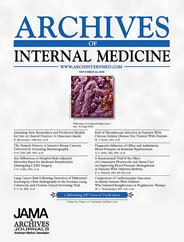by
Barbara Kram, Editor | November 25, 2008

Archives of Internal Medicine
First, do no harm. Could that mean
not treating breast cancer? It's hard to believe but a new study in the Archives of Internal Medicine (JAMA) showed that many invasive breast cancers in the group studied resolved on their own.
Per-Henrik Zahl, M.D., Ph.D., of the Norwegian Institute of Public Health, Oslo, and colleagues examined breast cancer rates among 119,472 women age 50 to 64 who were all invited to participate in three rounds of screening mammograms between 1996 and 2001 as part of the Norwegian Breast Cancer Screening Program. They compared these to rates among a control group of 109,784 women age 50 to 64 in 1992, who would have been invited for screening if the program had existed at that time. Cancers were tracked for six years using a national registry, and at the end of that time all participants were invited to undergo a one-time screening to assess breast cancer prevalence.
As anticipated, breast cancer rates were higher among screened women than among the control group before the final prevalence screening. "Even after prevalence screening in controls, however, the cumulative incidence of invasive breast cancer remained 22 percent higher in the screened group," the authors write. Of every 100,000 screened women, 1,909 had breast cancer during the six-year period, compared with 1,564 of every 100,000 in the control group. Screened women were more likely to have breast cancer at every age.




Ad Statistics
Times Displayed: 32710
Times Visited: 865 Stay up to date with the latest training to fix, troubleshoot, and maintain your critical care devices. GE HealthCare offers multiple training formats to empower teams and expand knowledge, saving you time and money
"Because the cumulative incidence among controls never reached that of the screened group, it appears that some breast cancers detected by repeated mammographic screening would not persist to be detectable by a single mammogram at the end of six years," the authors write. "This raises the possibility that the natural course of some screen-detected invasive breast cancers is to spontaneously regress."
"Although many clinicians may be skeptical of the idea, the excess incidence associated with repeated mammography demands that spontaneous regression be considered carefully," they continue. "Spontaneous regression of invasive breast cancer has been reported, with a recent literature review identifying 32 reported cases. This is a relatively small number given such a common disease. However, as some observers have pointed out, the fact that documented observations are rare does not mean that regression rarely occurs. It may instead reflect the fact that these cancers are rarely allowed to follow their natural course."
The findings do not answer the question of whether mammograms prevent deaths from breast cancer, the authors note. "Instead, our findings simply provide new insight on what is arguably the major harm associated with mammographic screening, namely, the detection and treatment of cancers that would otherwise regress," they conclude.
This finding could one day change protocols for screening. The risks of treatment, in cases where it is not called for, are significant such as radiation damage to the heart. The findings are controversial. The lead author had difficulty finding a journal to publish his statistical works.
"Uncertainty about the value of mammography continues," according to an editorial in the journal. "If the spontaneous remission hypothesis is credible, it should cause a major re-evaluation in the approach to breast cancer research and treatment. Certainly it is worthy of further evaluation."
Ultimately, suspicious lesions must be biopsied and, if cancerous, treated, most experts who commented on the study conclude, because it is not yet possible to know which cancers will progress and which will resolve.
Citation: The Natural History of Invasive Breast Cancers Detected by Screening Mammography, Archives of Internal Medicine 2008;168[21]:2311-2316.)
Read the abstract:
http://archinte.ama-assn.org/cgi/content/full/168/21/2311

